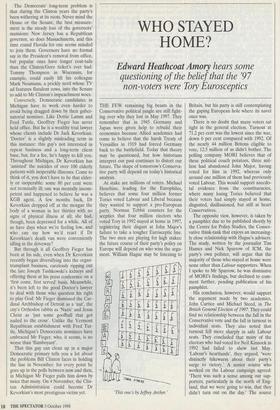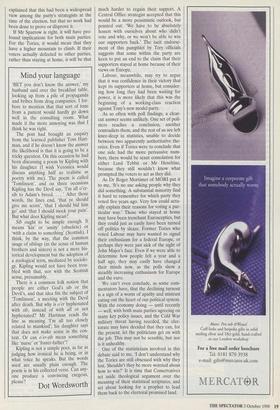WHO STAYED HOME?
Edward Heathcoat Amory hears some
questioning of the belief that the '97 non-voters were Tory Eurosceptics
THE FEW remaining big beasts in the Conservative political jungle are still fight- ing over why they lost in May 1997. They remember that in 1945 Germany and Japan were given help to rebuild their economies because Allied academics had come to believe that the harsh Treaty of Versailles in 1919 had forced Germany back to the battlefield. Today that theory may be questioned, but how historians interpret our past continues to distort our future. The shape of tomorrow's Conserva- tive party will depend on today's historical analysis.
At stake are millions of voters. Michael Heseltine, leading for the Europhiles, believes that some four million former Tories voted Labour and Liberal because they wanted to support a pro-European party. Norman Tebbit counters for the sceptics that four million electors who voted Tory in 1992 stayed at home in 1997, registering their disgust at John Major's failure to take a tougher Eurosceptic line. The two men are playing for high stakes: the future course of their party's policy on Europe will depend on who wins the argu- ment. William Hague may be listening to `This one's by Jeffrey Archer.' Britain, but his party is still contemplating the gaping European hole where its navel once was.
There is no doubt that many voters sat tight in the general election. Turnout at 71.2 per cent was the lowest since the war, down 6 per cent compared with 1992. Of the nearly 44 million Britons eligible to vote, 12.5 million of us didn't bother. The polling company MORI believes that of these political couch potatoes, three mil- lion had abandoned John Major, having voted for him in 1992, whereas only around one million of them had previously voted Labour. This would support anecdo- tal evidence from the constituencies, where many losing Tories believed that their voters had simply stayed at home, disgusted, disillusioned, but still at heart Conservatives.
The opposite view, however, is taken by a pamphlet due to be published shortly by the Centre for Policy Studies, the Conser- vative think-tank that enjoys an increasing- ly close relationship with Hague's advisers. The study, written by the journalist Tim Hames and Nick Sparrow of ICM, the party's own pollster, will argue that the majority of those who stayed at home were none other than Labour supporters. When I spoke to Mr Sparrow, he was dismissive of MORI's findings, but declined to com- ment further, pending publication of his pamphlet.
His conclusion, however, would support the argument made by two academics, John Curtice and Michael Steed, in The British General Election of 1997. They could find no relationship between the fall in the Conservative vote and the fall in turnout in individual seats. They also noted that turnout fell more sharply in safe Labour seats. They concluded that many of the electors who had voted for Neil Kinnock in 1992 had failed to show last May. `Labour's heartlands', they argued, 'were distinctly lukewarm about their party's surge to victory.' A senior source who worked on the Labour campaign agreed: `There was such a sense among our sup- porters, particularly in the north of Eng- land, that we were going to win, that they didn't turn out on the day.' The source explained that this had been a widespread view among the party's strategists at the time of the election, but that no work had been done to prove or disprove it.
If Mr Sparrow is right, it will have pro- found implications for both main parties. For the Tories, it would mean that they have a higher mountain to climb. If their voters actually defected to other parties, rather than staying at home, it will be that much harder to regain their support. A Central Office strategist accepted that this would be a more pessimistic outlook, but pointed out: 'We have to be absolutely honest with ourselves about who didn't vote and why, or we won't be able to win our supporters back.' The tacit endorse- ment of this pamphlet by Tory officials suggests that some within the party are keen to put an end to the claim that their supporters stayed at home because of their views on Europe.
Labour, meanwhile, may try to argue that it was confidence in their victory that kept its supporters at home, but consider- ing how long they had been waiting for power, it is more likely that this was the beginning of a working-class reaction against Tony's new model party.
As so often with poll findings, a clear- cut answer seems unlikely. One set of poll- sters reaches a conclusion, another contradicts them, and the rest of us are left knee-deep in statistics, unable to decide between two apparently authoritative the- ories. Even if Tories were to conclude that one side had the more persuasive num- bers, there would be scant consolation for either Lord Tebbit or Mr Heseltine, because they still wouldn't know what prompted the voters to act as they did.
As Dr Roger Mortimer of MORI put it to me, 'It's no use asking people why they did something. A substantial minority find it hard to remember for which party they voted five years ago. Very few could actu- ally explain their reasons for voting a par- ticular way.' Those who stayed at home may have been trenchant Eurosceptics, but they could just as easily have been turned off politics by sleaze. Former Tories who voted Labour may have wanted to signal their enthusiasm for a federal Europe, or perhaps they were just sick of the sight of John Major's face. Even if we were able to determine how people felt a year and a half ago, they may easily have changed their minds now, as the polls show a steadily increasing enthusiasm for Europe and the euro.
We can't even conclude, as some com- mentators have, that the declining turnout is a sign of a worm of apathy and mistrust eating out the heart of our political system. With the economy doing — until recently — well, with both main parties agreeing on many key policy issues, and the Cold War military threat having receded, the elec- torate may have decided that they can, for the present, let the politicians get on with the job. This may not be sensible, but nor is it unhealthy.
One of the statisticians involved in this debate said to me, 'I don't understand why the Tories are still obsessed with why they lost. Shouldn't they be more worried about how to win?' It is time that Conservatives set aside theological argument over the meaning of their statistical scriptures, and set about looking for a prophet to lead them back to the electoral promised land.











































































 Previous page
Previous page